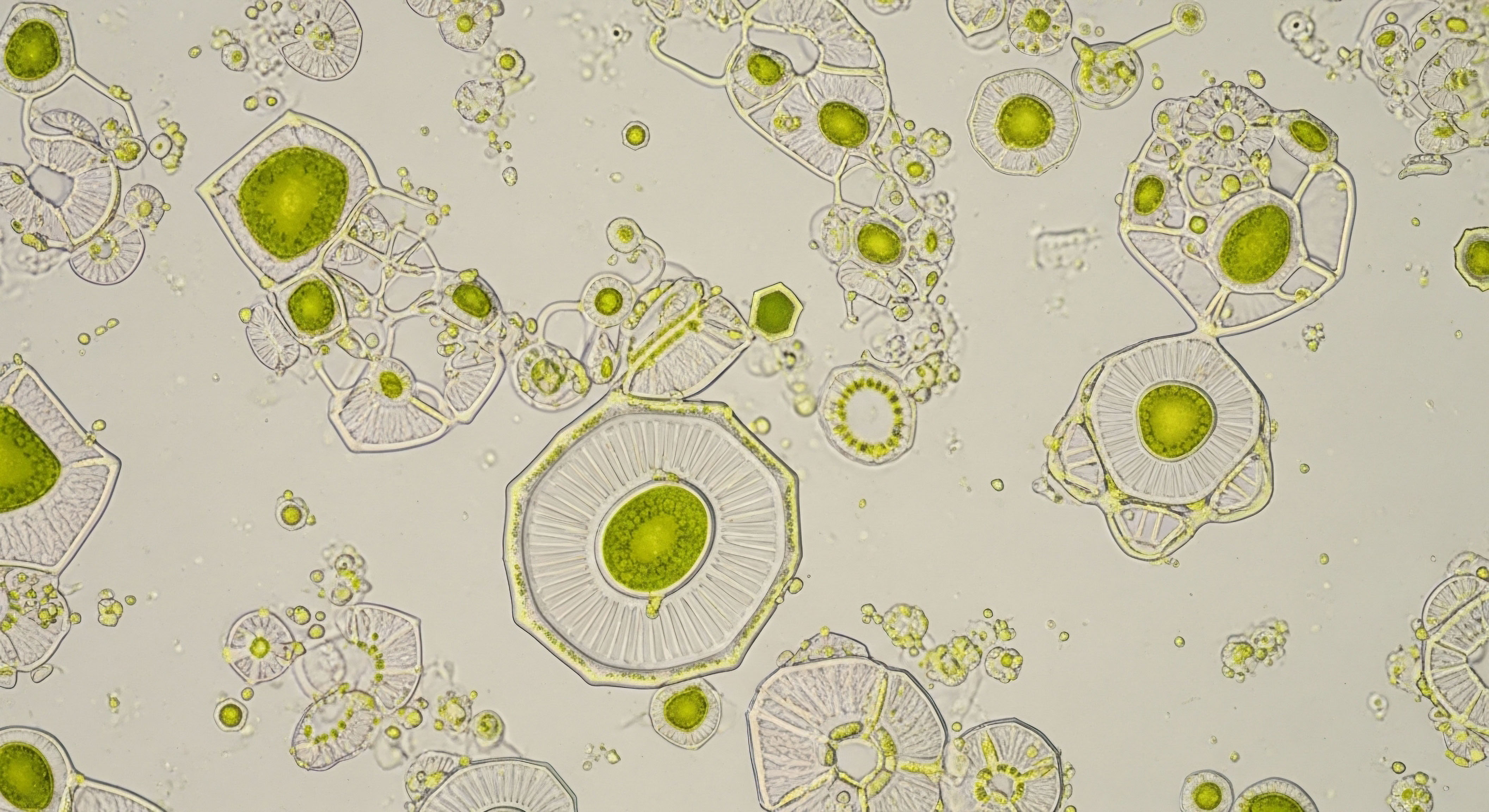

The Biological Imperative for Peak Existence
Human physiology operates as a sophisticated biological system, designed for resilience and peak function. Over time, however, natural biological processes can lead to a decline in critical hormonal balances and cellular signaling pathways. This decline manifests as reduced energy, diminished cognitive acuity, slower recovery, and compromised body composition.
Peptide science offers a precise, targeted approach to recalibrate these systems, restoring and enhancing the body’s innate capacity for optimal performance and vitality. It is not about artificial intervention but about intelligent biological restoration and amplification.
The endocrine system, a master regulator of virtually all bodily functions, orchestrates everything from metabolism and mood to muscle growth and immune response. As we age, or due to environmental stressors and lifestyle factors, the efficiency and output of this system can wane.
Hormones like testosterone, growth hormone, and insulin-like growth factor 1 (IGF-1) play pivotal roles in maintaining physical and mental prowess. Their decline is a direct correlate to diminished performance metrics. Peptide science directly addresses these fundamental drivers, providing the body with specific signaling molecules that can re-engage dormant pathways or boost existing ones. This is the essence of proactive biological management.

The Erosion of Biological Capital
Biological capital represents the inherent physiological resources and capabilities of an individual. This capital is built over years but can be depleted by suboptimal hormonal states, cellular damage, and inefficient metabolic processes. The consequences are tangible ∞ a reduced capacity for physical exertion, impaired mental clarity, slower healing times, and a compromised immune system.
These are not mere inconveniences; they are indicators of a biological system operating below its design parameters. Peptide science provides the tools to not only halt this erosion but to actively rebuild and enhance this capital, ensuring a higher baseline for performance and longevity.

Restoring Hormonal Harmony
Key hormones are the conductors of our physiological orchestra. Testosterone, for instance, is crucial for muscle mass, bone density, red blood cell production, libido, and mood regulation in both men and women. Growth hormone (GH) and its mediator IGF-1 are vital for cellular repair, muscle growth, fat metabolism, and overall tissue regeneration.
Their diminished levels are directly linked to the hallmarks of aging and reduced performance. Peptide therapies can precisely target the signaling pathways that govern the production and release of these critical hormones, effectively turning back the clock on hormonal efficiency. This restoration is foundational to unlocking sustained peak performance.
Clinical data consistently demonstrates that optimizing endogenous hormone levels, through scientifically validated peptide protocols, correlates with significant improvements in lean body mass, bone mineral density, and cardiovascular health markers.

The Signaling Cascade for Cellular Renewal
Peptides are short chains of amino acids that act as signaling molecules within the body, communicating instructions between cells. They are the messengers that tell your cells what to do, when to do it, and how. Many peptides are naturally occurring and are essential for processes like tissue repair, immune function, appetite regulation, and energy metabolism.
Therapeutic peptides are designed to mimic or enhance these natural signals, offering a highly specific and potent way to influence biological processes. They provide the body with precise instructions to optimize cellular function, promote regeneration, and enhance overall physiological output. This targeted communication is key to advanced biological optimization.

Beyond Basic Functionality ∞ The Drive for Mastery
The pursuit of peak performance extends beyond merely counteracting decline. It is about achieving a state of biological mastery where the body and mind operate at their highest potential. This requires a sophisticated understanding of physiological systems and the strategic application of science-based interventions.
Peptide science offers a sophisticated pathway to this mastery, enabling individuals to fine-tune their biological machinery for superior strength, endurance, cognitive function, and resilience. It is the application of cutting-edge biological intelligence to achieve unprecedented levels of personal capability.


The Molecular Engineering of Superior Physiology
Peptide science operates on the principle of precise molecular signaling. Peptides are the body’s natural communicators, and therapeutic peptides are designed to amplify or redirect these essential conversations at the cellular level. This molecular engineering allows for highly targeted interventions that can influence specific biological pathways with remarkable accuracy.
Understanding how these peptides function is akin to understanding the intricate engineering blueprints of the human body. They provide the specific instructions needed to optimize cellular machinery, promote regeneration, and enhance metabolic efficiency, thereby upgrading overall physiological output.
The efficacy of peptide science lies in its ability to interact with specific cellular receptors, triggering cascades of events that lead to desired physiological outcomes. Unlike broad-acting pharmaceuticals, peptides often offer a more nuanced and specific interaction, minimizing off-target effects and maximizing therapeutic precision.
This allows for a tailored approach to enhancing performance, accelerating recovery, and improving overall well-being. The body is a complex system, and peptides provide a sophisticated means of interacting with its core regulatory mechanisms.

Key Peptide Classes and Their Mechanisms
The landscape of therapeutic peptides is vast, with each class designed to address specific physiological needs. These molecules work by binding to cell surface receptors or entering cells to modulate gene expression and protein synthesis. Their action is direct, specific, and potent, offering a powerful means of biological optimization.

Growth Hormone Secretagogues (GHS)
Peptides such as GHRP-2, GHRP-6, Ipamorelin, and Hexarelin are designed to stimulate the pituitary gland to release more growth hormone (GH). They achieve this by interacting with the ghrelin receptor in the hypothalamus and pituitary. Increased GH levels promote lipolysis (fat breakdown), muscle growth, collagen synthesis, and enhanced tissue repair. They essentially signal the body to access its natural growth and repair mechanisms more effectively.

Growth Hormone Releasing Hormones (GHRH) and Analogs
Peptides like Sermorelin and Tesamorelin are analogs of the naturally occurring GHRH, which also stimulates GH release from the pituitary. They bind to GHRH receptors, promoting pulsatile GH secretion. This targeted stimulation supports metabolic health, improves body composition, and enhances recovery processes, offering a pathway to youthful endocrine function.

Peptides for Tissue Repair and Regeneration
Molecules like BPC-157 (Body Protection Compound) and TB-500 (Thymosin Beta-4) are renowned for their potent regenerative capabilities. BPC-157, derived from a protein found in gastric juice, exhibits remarkable healing properties for the gut, muscles, tendons, ligaments, and even the nervous system.
TB-500, a synthetic version of a naturally occurring peptide, promotes cell migration, tissue repair, and reduces inflammation, making it invaluable for recovery from injury and intense physical exertion. They act as biological architects, directing cellular resources to sites of damage and initiating robust repair processes.

Metabolic and Cellular Health Peptides
Other peptides target specific metabolic pathways. For example, AICAR (Acadesine) can mimic the effects of exercise by activating AMP-activated protein kinase (AMPK), enhancing glucose uptake and fatty acid oxidation. CJC-1295, a long-acting GHRH analog, provides sustained stimulation of GH release. These peptides offer sophisticated levers to fine-tune energy metabolism, improve insulin sensitivity, and support cellular longevity.
Research indicates that specific peptide sequences can modulate cellular behavior, promoting angiogenesis, reducing inflammation, and accelerating the repair of damaged tissues, offering a novel paradigm for recovery and longevity.

The Systems Approach to Peptide Application
Effective peptide science is not about isolated interventions but about understanding how these molecules integrate into the broader physiological system. This requires a holistic view, considering the interplay between hormones, neurotransmitters, and metabolic pathways. A skilled practitioner views the body as an integrated network, where optimizing one pathway can have synergistic effects on others. For example, improving growth hormone signaling can positively impact metabolic rate and tissue repair, which in turn supports overall physical performance.

Personalized Protocol Design
The optimal application of peptide science is deeply personalized. It begins with comprehensive diagnostic assessments to understand an individual’s unique biological baseline ∞ hormone levels, metabolic markers, inflammatory indicators, and genetic predispositions. Based on this data, a bespoke protocol is designed, selecting specific peptides, determining appropriate dosages, and establishing optimal timing and administration methods. This precision ensures that interventions are maximally effective and aligned with individual performance and vitality goals.

Integration with Foundational Health Practices
Peptide science represents an advanced layer of optimization. Its greatest impact is realized when integrated with fundamental health pillars ∞ optimal nutrition, consistent and strategic exercise, quality sleep, and stress management. These foundational elements create the optimal internal environment for peptides to exert their beneficial effects. For instance, adequate protein intake is essential for peptide synthesis and repair processes, while quality sleep maximizes the natural release of growth hormone, which peptides can further support.


Strategic Implementation for Sustained Biological Advantage
The strategic timing and application of peptide science are paramount to achieving desired outcomes. This is not a matter of indiscriminate use but of precise, evidence-based implementation. Understanding when to introduce specific peptides, at what dosages, and in what combinations, dictates their efficacy and safety.
This phase involves leveraging clinical data and expert guidance to map out a biological roadmap that aligns with an individual’s specific objectives, whether they are focused on athletic performance, cognitive enhancement, metabolic health, or accelerated recovery.
The decision to employ peptide science is a proactive step towards maximizing biological potential. It is most impactful when integrated into a comprehensive health strategy, rather than being viewed as a standalone solution. This approach ensures that the body is primed to receive and respond to these powerful signaling molecules, leading to more robust and sustainable results. The “when” is as critical as the “what” and “how,” demanding a thoughtful, data-driven approach.

The Criticality of Diagnostics and Assessment
Effective implementation begins with a thorough understanding of the individual’s current biological state. Comprehensive diagnostic testing is the cornerstone of any successful peptide protocol. This includes detailed blood work to assess hormone levels (testosterone, estrogen, progesterone, DHEA-S, cortisol, GH, IGF-1), metabolic markers (glucose, insulin, lipids, HbA1c), inflammatory markers (CRP, homocysteine), and nutrient deficiencies. Genetic testing may also provide valuable insights into individual responses and predispositions.

Timing for Performance and Recovery
For athletes and high-performers, the timing of peptide administration is crucial for optimizing training cycles, enhancing recovery, and preventing injury. Peptides that support tissue repair, such as BPC-157 and TB-500, are often administered strategically around intense training periods or following acute injuries.
Growth hormone secretagogues can be timed to coincide with natural GH release patterns, often in the evening or post-exercise, to maximize their anabolic and regenerative effects. The goal is to align peptide action with the body’s natural recovery and growth phases.

The Role in Longevity and Anti-Aging
In the context of longevity science, peptides are employed to counteract the age-related decline in cellular function and hormonal balance. Protocols often focus on maintaining optimal levels of GH and IGF-1, supporting cellular repair mechanisms, and enhancing metabolic flexibility.
This approach aims not just to extend lifespan but to enhance healthspan ∞ the period of life spent in good health and peak function. The “when” here is a continuous, long-term strategy, focused on maintaining youthful physiological function for as long as possible.
Longevity research increasingly points to the importance of maintaining hormonal equilibrium and robust cellular repair pathways. Peptide interventions offer a targeted means to support these critical pillars of healthy aging.

Personalized Protocols and Progression
Peptide protocols are not one-size-fits-all. They are dynamic, evolving based on individual response and ongoing assessment. An initial protocol might focus on establishing a healthy hormonal baseline or addressing specific recovery needs. As the individual progresses, the protocol can be adjusted to further enhance performance, optimize body composition, or support cognitive function. This iterative process, guided by regular monitoring and expert evaluation, ensures that the peptide strategy remains aligned with the individual’s evolving goals and biological feedback.

Safety and Ethical Considerations
The responsible application of peptide science necessitates a strong emphasis on safety and ethical practice. This includes sourcing peptides from reputable, quality-controlled manufacturers, adhering to evidence-based dosing guidelines, and ensuring that all interventions are supervised by qualified healthcare professionals. Patients must be fully informed about the potential benefits, risks, and administration methods.
The “when” also encompasses recognizing when a peptide intervention is not indicated or when it should be paused or discontinued based on physiological response or adverse events.

Integrating Peptides into a Lifelong Optimization Strategy
The true power of peptide science is unlocked when it is viewed as a component of a lifelong commitment to biological optimization. It is a sophisticated tool that, when used wisely and strategically, can significantly enhance quality of life, performance capacity, and healthspan.
The decision to implement peptide science is a commitment to actively managing one’s biology, embracing advanced strategies to live a more vital, capable, and resilient life. The “when” is ultimately a personal choice to invest in one’s biological future.

The Zenith of Your Personal Biological Mastery
Peptide science represents a paradigm shift in how we approach human performance and vitality. It moves beyond reactive symptom management to proactive, intelligent biological optimization. By understanding and precisely influencing the body’s core signaling pathways, individuals can unlock unprecedented levels of physical and cognitive function, accelerate recovery, and enhance their overall healthspan.
This is not merely about adding years to life, but adding life to years. The journey to peak existence is an ongoing process of learning, adaptation, and strategic intervention, with peptide science serving as a powerful ally in mastering your own biological destiny.
The science is clear ∞ the body is a dynamic system, responsive to precise biological instructions. Peptide science provides these instructions, enabling a recalibration of fundamental physiological processes. It empowers individuals to transcend limitations, reclaim their vitality, and operate at the apex of their capabilities. This is the promise of intelligent biological design, applied to the most important system you will ever own ∞ your own body.

Glossary

cellular signaling

peptide science

vitality

endocrine system

growth hormone

peak performance

tissue repair

biological optimization

therapeutic peptides

metabolic health

longevity science




